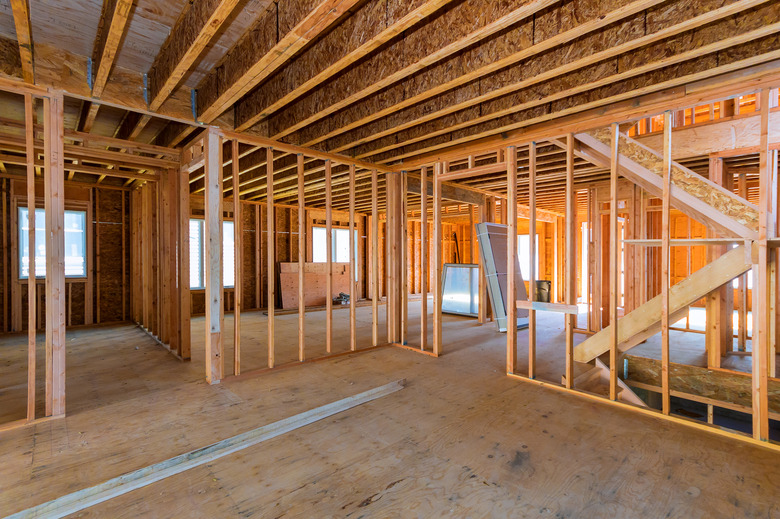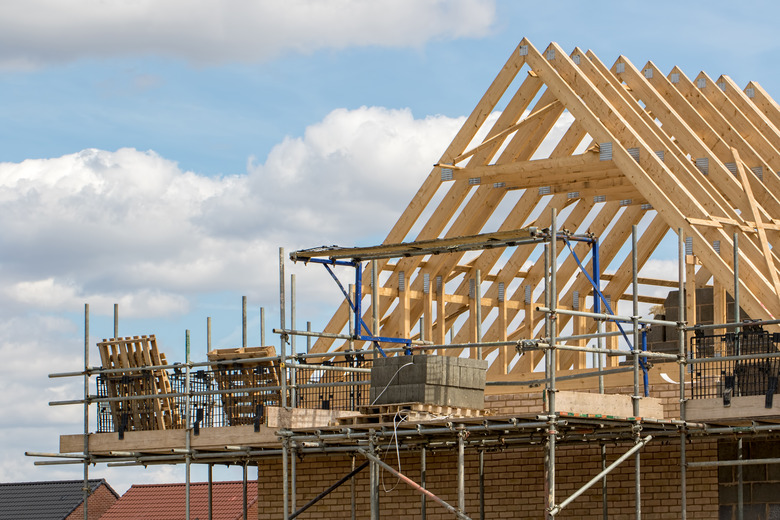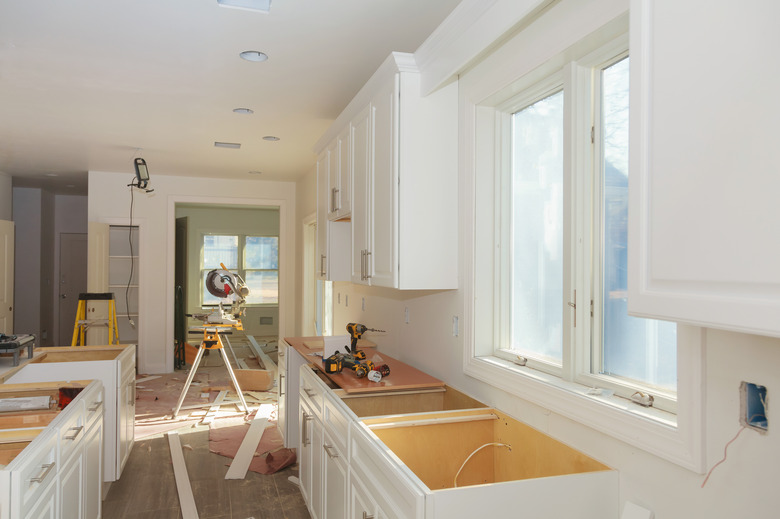What You Need To Know Before You Hire A Builder For A Custom Home
Though older homes have their charm, they can also come with major headaches — asbestos, old knob and tube wiring, and foundation issues, to name a few. If a new home is what you're interested in (and all of its new appliances, custom designs, and brand new plumbing), then you'll need need four things to get the project started: a plot of land, a source of funding (usually a lender), a home designer, and a custom builder. And although it may seem backward, it's actually crucial to find the builder before you start looking for funding — mostly because lenders often don't finance land sales unless the buyer is already working with a builder.
But where exactly do you find a reputable home builder? And what other pieces of the puzzle need to come together to design and build your dream home? Here's what you need to know before you hire.
What Custom Homebuilders Do
What Custom Homebuilders Do
You may be a builder yourself, but even if you are, you'll probably want to hire a custom homebuilder who is familiar with local building codes, land-use laws, and zoning regulations to ensure your project doesn't get bogged down in red tape and end up draining your bank account. Besides freeing up your time for other things, the important services a custom builder offers include:
- Working in conjunction with the designer or architect during the design process to establish the floor plans and other structural details.
- Acting as a liaison between the client, the building authorities, and the lender.
- Managing the money flow throughout the building process and coordinating payments for subcontractors and materials as well as fees for required permits and inspections.
- Securing the necessary permits and scheduling inspections.
- Scheduling and coordinating subcontractors, receiving and checking building materials, and managing all aspects of the construction process.
- Managing updates to the design during the building process, working closely with the designer when changes to the original design occur, and keeping the homeowner in the loop when changes occur.
- Obtaining the certificate of occupancy upon completion of the project and educating the new homeowner on issues of proper use and maintenance of the new home.
The role of liaison between the homeowner, lender, and designer calls for strong communications skills as well as expert knowledge of the building process. Considering that a custom home is a one-of-a-kind structure, this role is especially important because glitches are bound to occur, and the homeowner needs to stay abreast of design shifts and the resulting budget modifications.
Doing Your Homework
Doing Your Homework
If you begin the process of building your new home by hiring a custom builder, you shouldn't have to do much in the way of designing and budget planning beforehand — because the builder will guide you through that. One reason that's a better approach is that you may find that all the bells and whistles you want would end up costing more than you can afford. It's important to have a clear idea of the design parameters so the builder has something to go on, but you can work through the details with the builder and the designer you subsequently hire.
Another way to approach building a custom-style new home, particularly if you already own the land, is to hire an architect to research all relevant building codes, land-use laws, and other regulations along with environmental characteristics, such as soil quality and topography, and complete a design before you start looking for a builder. The problem with this approach is that input from a reputable builder who brings expert knowledge of home construction techniques and materials costs to the table is invaluable during the design process. Waiting until after completion of the design to hire a builder could lead to unforeseen change orders, which also add time and possibly extra cash to the design process.
If you start the building process by hiring a custom homebuilding contractor, the main task before you is to find the right one. There's nothing to stop you from also hiring an independent architect, but because the builder and architect have to work closely together and should be compatible, it's often a better idea to allow the builder to guide you in choosing one. If you contract with a design-build firm, in-house designers will be available, and even large, reputable building contractors who do not specialize in design usually have their own network of designers with whom they work regularly.
Design-Build vs. Building Contractor
Design-Build vs. Building Contractor
To take your dream home from sketch in your head to reality that you live in, you'll need to have the right professional team alongside you — and you have a couple of different options. When working on a high-level design, it often makes sense to hire an independent architect, but that also means you'll need to hire a separate building contractor to help you actually build out the design. On the other hand, with a design-build firm, which is a company with in-house designers who work closely with construction crews, there's no need to shop around for one or the other. Both options present pros and cons for homeowners.
A design-build firm is one that handles both the design and construction end of things, and the most important advantage of working with a one is the guarantee that the builder and designer are in good communication with each other and are able to collaborate. A good designer stays on top of the project from start to finish, ensuring the design is implemented closely, and this is easier when the designer and builder work under the same roof. On the downside, when the designer and builder work too closely together, they may forget to keep the homeowner in the loop concerning design changes and budget overages.
On the other hand, if the hope is that your dream home truly be one of a kind, you may be willing to exchange the efficiency of the design-build model for an architect who specializes in designer homes. In this case, you would hire a custom building contractor after you start working with the architect, perhaps following their recommendation to find the builder. Similarly, you might find a builder with whom you want to work, and that person might recommend an architect or designer.
When the builder and designer work for different firms, you can't expect them to collaborate as closely as they would if they worked for the same one, but a little creative tension often produces more interesting results. A healthy amount of creative friction also serves to keep negotiations above board and, importantly, keeps the homeowner at the center of the construction process.
Choosing the Right Custom Homebuilder
Choosing the Right Custom Homebuilder
Local homebuilders who specialize in custom building don't always advertise — usually because they are too busy building — and you find the best builders by referrals from friends, real estate professionals, other builders, or home designers. Failing leads from local sources, you can also search the National Association of Home Builders (NAHB) directory for local homebuilders in the area in which you want to build.
Take your time with the selection process; your dream home is a big investment. In the initial stages of shopping around, use a short list of questions to narrow the field. Some of the most important are:
- How busy are you? Someone who is already up to her eyeballs in work for the foreseeable future probably isn't the ideal candidate for your job. On the other hand, someone who is idle and ready to start tomorrow may not be the expert builder for whom you're searching. Ideally, you're looking for a contractor who is actively working but has enough space in her schedule for your job in the not-too-distant future.
- What percentage of your builds are custom? It's common for builders to switch between custom and conventional building projects. You want one who focuses primarily on the former.
- Are you licensed, bonded, and insured? It isn't in your best interest to hire anyone who answers no to any of these.
- What are your values when it comes to building? You want someone whose values align with yours.
Once you've narrowed the field to a short list of potential builders (two or three), you can conduct a more detailed interview in which you ask for references, pictures of past projects, and specifics, like license number and insurance details. Check out the website maintained by the builder or the builder's firm, the builder's social media pages, and any other presence the builder maintains online. Be sure to call each of the references supplied by the builder and ask for details about the builder's attention to detail, work ethic, and communication abilities.
The Cost of Hiring a Custom Builder
The Cost of Hiring a Custom Builder
Unlike a tradesperson, such as a plumber or electrician, a custom homebuilder doesn't charge a flat fee or bill you by the hour. Instead, the builder's fees are rolled into the home construction costs, and the quote you'll receive will be for the cost of the entire project, including all the materials and labor costs as well as permitting fees and incidentals. The builder's profit typically accounts for 9.1 percent of the total amount buyers pay for home construction.
The cost of building a home is about $150 per square foot on average, and the cost is bound to be higher than that if you build to an original design and select top-grade materials. Getting a rough estimate during the interview is an important part of the interview because it helps weed out problematic builders, who are usually the ones who present lowball bids in an effort to get business. Quality builders will usually give quotes that are in the same ballpark with one another. Once you've made your choice from the builders giving reasonable estimates and you're ready to start work, be sure to get all subsequent agreements, including the final quote, in writing.
Custom Homebuilder Licensing and Certification
Custom Homebuilder Licensing and Certification
Custom homebuilders are general contractors, and as such, they don't require licensing in every state. States that don't require licenses usually defer to local authorities, such as cities, counties, or a contractors' board, and these authorities or groups generally require business licenses. State and other licensing authorities usually require bonding. Insurance is optional, but on a large homebuilding project, the builder should carry both liability and workers' compensation insurance to cover anyone injured on the job site. The best builders belong to a national builders' organization, such as the NAHB, the Associated General Contractors of America, or a local organization.
References
- Washington Post: What You Need to Know Before Building a Custom Home
- Thomas Building Company: Things to Consider When Hiring a Custom Home Builder
- Carlisle Wide Plank Floors: What to Expect When Hiring a Builder for Your Custom Home
- National Association of Home Builders: Professional Remodelers
- HousingEconomics.com: Cost of Constructing a Home
- Realtor.com: How To Hire a Home Builder: Costs and Questions To Ask
- Next: General Contractor License Requirements by State: Next Insurance Guide


